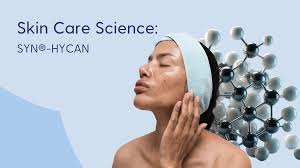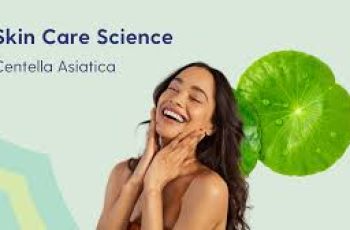
Tetradecyl Aminobutyroylvalylaminobutyric Urea Trifluoroacetate in Skin Care
Tetradecyl Aminobutyroylvalylaminobutyric Urea Trifluoroacetate, also known as SYN®-HYCAN, is a small peptide (less than 500 Da) widely used in skincare products for its powerful anti-aging properties. This peptide is specifically designed to boost hyaluronic acid (HA) production within the skin. HA is a crucial component of the extracellular matrix (ECM), which helps retain moisture, adding volume and improving skin firmness.
This fascinating ingredient is found in the top selling medical grade skin care brand Alastin.
In this article, I will discuss why this is one of the hotttest new antiaging ingredients in skin care.
Boosts Hyaluronic Acid production
Enhances skin firmness and elasticity
Improves skin hydration
Has a poor EWG safety rating due to a component that is a PFA
What is SYN®-HYCAN?
Tetradecyl Aminobutyroylvalylaminobutyric Urea Trifluoroacetate is a peptide that increases hyaluronic acid (HA) synthesis within the skin. By boosting HA production, it helps the skin retain more moisture, adding volume and making it appear plumper. Increasing HA within the extracellular matrix (ECM) facilitates signaling that improves fibroblast functionality, leading to increased production of many components such as HA and collagen. This plumps skin volume, firms skin, decreases laxity and reduces sagging. It hydrates and strengthens the skin structure, contributing to a smoother, more youthful complexion.
What Does It Do?
Tetradecyl Aminobutyroylvalylaminobutyric Urea Trifluoroacetate works by increasing the production of hyaluronic acid, which is a naturally occurring substance in the skin responsible for maintaining moisture and structural integrity. It stimulates the fibroblasts, which are the skin cells that produce collagen and HA, to increase HA synthesis. As the levels of HA in the skin rise, skin retains more water, leading to enhanced hydration, plumper skin, and reduced appearance of wrinkles. This peptide’s action also supports collagen production, which in turn firms, strengthens, and smooths the skin.
Matrisome
Increasing levels of HA helps improve matrisome function.
The matrisome is the collection of proteins and structures that make up the extracellular matrix (ECM) and are essential for skin health. It provides a scaffold for cells, helping maintain the skin’s structure and communication between cells like fibroblasts, which are responsible for producing collagen, HA, other glycosaminoglycans, and key proteins.
Function of the Matrisome
The matrisome surrounds fibroblasts and supports the cytoskeleton, which helps fibroblasts adhere to the matrix and communicate with other cells. The matrisome’s interaction with the fibroblast cytoskeleton generates mechanical forces, which are transmitted through structures called LINX complexes to the fibroblast’s DNA. This “tug” on the cytoskeleton activates the fibroblast’s DNA to produce important components like collagen and hyaluronic acid, which are crucial for keeping the skin firm, hydrated, and youthful. (1)
Benefits
Increasing the amount of HA in skin gives the following skin benefits:
Firms
Tightens
Reduces Laxity
Hydrates
Plumps
Gives Jello-O skin
Side Effects and Safety
This ingredient receives a safety rating of 10 from the Environmental Working Group (EWG), indicating that it is considered unsafe. The concern arises from the inclusion of trifluoroacetate , a fluorinated compound classified as a PFA (Per- and Polyfluoroalkyl Substance). PFAs are known for their strong carbon-fluorine bonds, which make them highly persistent in the environment and raise potential health concerns due to their bioaccumulation and toxicity.
There seems to be differing opinions about the safety of this ingredient. I am looking into this to learn more.
SYN®-HYCAN is well-tolerated by most skin types, with minimal reported side effects.
Products
Tetradecyl Aminobutyroylvalylaminobutyric Urea Trifluoroacetate is a key ingredient in HA Serums. The tripeptide works by increasing the skin’s HA production, making it one of the most effective products for achieving plump and hydrated skin.
Research Studies
Several interesting studies have highlighted the ability of Tetradecyl Aminobutyroylvalylaminobutyric Urea Trifluoroacetate to increase HA in skin.
Widgerow et al. (2022) : This study focused on the molecular weight of hyaluronic acid (HA). Widgerow et al. demonstrated that SYN®-HYCAN stimulates fibroblast production of high molecular weight HA (~2 MDa), which has anti-inflammatory and regenerative properties. The peptide was found to significantly improve skin hydration and regeneration, promoting a healthier extracellular matrix.
Garre et al. (2017) : In an open-label clinical study, a SYN®-HYCAN-based product was tested on 33 women aged 45–65. After 56 days, the participants showed improved facial contouring, skin firmness, hydration, and elasticity. The peptide’s ability to increase HA production was linked to reduced sagging and wrinkles, with participants also reporting subjective improvements in skin texture.
Gempeler et al. (2018) : This study explored the impact of SYN®-HYCAN on dermal remodeling. Using advanced imaging techniques, the peptide was shown to enhance skin volume and firmness across multiple facial zones. Over 87% of the study participants reported smoother, more supple skin, with nearly 70% confirming improved elasticity. This supports the peptide’s role in non-invasive facial remodeling.
These studies together highlight SYN®-HYCAN’s effectiveness in increasing HA production and enhancing skin firmness and hydration, making it a potent anti-aging ingredient.
Conclusion
In conclusion, SYN®-HYCAN is a scientifically backed peptide that significantly boosts hyaluronic acid production, enhancing skin hydration, volume, and firmness. Multiple studies have demonstrated its ability to reduce sagging, improve facial contour, and promote a more youthful appearance. By supporting the extracellular matrix, it offers non-invasive anti-aging benefits, making it an effective ingredient in modern skincare.
It’s essential to know which of the 16 skin types you are. Once you do, we can guide you to the best products for your skin. Look for the octagon symbol that matches your skin type. Have questions? Visit our community on Reddit at r/skintypesolutions or ask our AI bot. Sign up for our educational newsletters to stay updated on skincare science.


